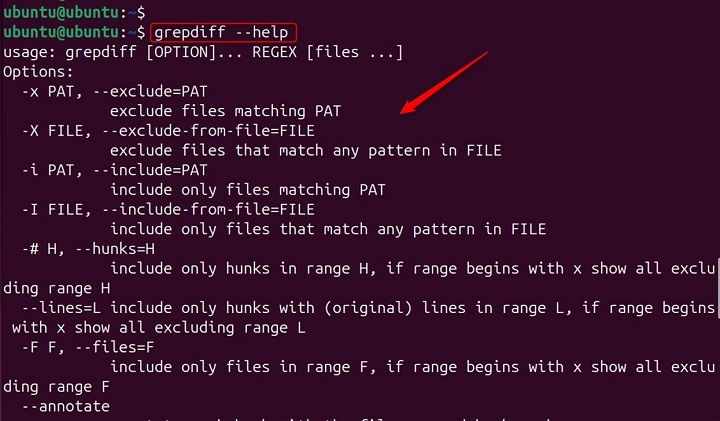
Grepdiff Command in Linux
Grepdiff is a powerful command-line utility that combines the functionalities of grep and diff, allowing you to efficiently compare files based on specific patterns or regular expressions. It's particularly useful for identifying differences between files that are too large or complex to examine manually.
Table of Contents
Here is a comprehensive guide to the options available with the Grepdiff command −
- Understanding grepdiff Command
- How to Use grepdiff Command
- Options grepdiff Command
- Examples of grepdiff Command in Linux
Understanding grepdiff Command
The grepdiff command is a powerful utility in Unix-like operating systems, used to filter diffs or patches by files that contain or do not contain a specified pattern. This command is particularly useful when dealing with large diffs and you need to focus on specific changes.
Lets check its version:
grepdiff --version

How to Use grepdiff Command?
The grepdiff command is versatile and can be combined with other commands to create powerful workflows for managing patches and diffs. For example, you can use grepdiff to filter a patch file for specific changes and then apply those changes using patch or git apply.
Options grepdiff Command
Understanding these options allows you to harness the full potential of grepdiff in your development or system administration tasks. Here's an in-depth look at the options available with grepdiff:
| Options | Descriptions |
|---|---|
| --number-files | When this option is used, file numbers are listed, starting at 1, before each filename. |
| --addoldprefix=PREFIX | Prefixes pathnames for old or original files in the output with the specified PREFIX. |
| --addnewprefix=PREFIX | Prefixes pathnames for updated or new files in the output with the specified PREFIX. |
| -p n, --strip-match=n | This option allows you to ignore the first n components of the pathname when matching. |
| -I FILE, --include-from-file=FILE | Includes files matching any pattern listed in FILE, one pattern per line. |
Examples of grepdiff Command in Linux
- Pattern-Based Comparison
- Contextual Comparison
- Overall Comparison
- Output Customization
- Efficiency and Performance
- Help Page
Pattern-Based Comparison
Specify a regular expression or pattern using the -e option. grepdiff will search for the pattern in both files and highlight the differences.
grepdiff -e "error" file1.txt file2.txt

This command will compare the contents of file1.txt and file2.txt, highlighting lines that contain the word "error".
Contextual Comparison
Use the -C option to include a specified number of lines of context around the matching lines. This helps you understand the surrounding context and identify the significance of the differences:
sudo grepdiff "error" analysis.txt decrypted_data.txt

This command will compare the files, highlighting lines containing the word "error" and including two lines of context above and below each match.
Overall Comparison
Include a specified number of lines of context around the matching lines. This helps you understand the surrounding context and identify the significance of the differences.
sudo grepdiff "solution" analysis.txt decrypted_data.txt

This command will compare the files, highlighting lines containing the word "solution" and including two lines of context above and below each match.
Note: If you're working with specific file formats (e.g., XML, JSON), you can use grepdiff in conjunction with tools like xmldiff or jsondiff to compare the files based on their structure.
Output Customization
Customize the output format using options like -u for unified diff format, -y for side-by-side comparison, and -p for patch format.
grepdiff -y file1.txt file2.txt

This command displays the differences in a side-by-side format.
Efficiency and Performance
grepdiff is optimized for large files and can handle complex comparisons efficiently. Consider using options like -l for a more concise output or -v to invert the match (highlight lines that don't match the pattern).
Help Page
grepdiff is a powerful command-line utility that combines the functionalities of grep and diff, allowing you to efficiently compare files based on specific patterns or regular expressions. It's particularly useful for identifying differences between files that are too large or complex to examine manually.
grepdiff --help

Additional Tips
For more advanced comparisons, explore options like -w for word matching, -i for case insensitive matching, and -x for exact match. Experiment with different output formats to find the one that best suits your needs. Consider using grepdiff in conjunction with other command-line tools for more complex tasks.
Conclusion
The grepdiff command is versatile and can be combined with other commands to create powerful workflows for managing patches and diffs. For example, you can use grepdiff to filter a patch file for specific changes and then apply those changes using patch or git apply.